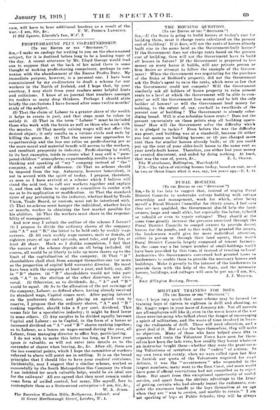PROFIT-SHARING PLUS CO-PARTNERSHIP.
(To Tat EDITOR or THE SPECILTOR."1 make no apology for writing to you on the above-named subject, for it is destined before long to be a leading topic of the day. A recent utterance by Mr. Lloyd George would lead one to suppose that at the back of his mind there is some thought of making profit-sharing compulsory, perhaps in con- nexion with the abandonment of the Excess Profits Duty. My immediate purpose, however, is a personal one. I have been commissioned by my co-directors to draft a scheme for our workers in the North of Ireland, and I hope that, by your courtesy, I may elicit from your readers some helpful hints and criticisms. I know of no journal that numbers amongst its readers so many sleep thinkers. Perhaps I should state briefly the conclusions I have formed after some twelve months' study of the subject.
(1) That the claim of Labour to a greater share of the wealth it helps to create is just, and that steps must be token to satisfy it. (2) That in the term " Labour " must be included those who work with the brain as well as those who work with the muscles. (3)That merely raising wages will not effect the desired object; it only results in a vicious circle and ends by killing the goose, Ac. (4) That the nearer one approaches to co-partnership and the less one relies on profit-sharing per as the more moral and material benefit will accrue to the workers, and resultant prosperity to industry. Profit-sharing by itself, in its best examples, tends to create what I may call a "pam- pered children " atmosphere; co-partnership results in a worker thinking and speaking of "my " company instead of " the " company, a world of difference. (5) That no scheme should he imposed from the top. Autocracy, however benevolent, is not in accord with the spirit of to-day. I propose, therefore, as soon as I have arrived at a scheme which I believe will stand the acid teat, to call our workers together and explain it, and then ask them to appoint a committee to confer with me as to its application or modification. (it) That the standard rates of pay pertaining to the industry, whether fixed by Trade Union, Trade Board, or custom, must not be interfered with. (7) That no scheme must hamper the individual, whether brain or muscle, worker in obtaining the best market possible for his abilities. 03 That the workers must share in the responsi- bility of manngement.
And now may I submit the outline of the scheme I favour? (I) I propose to divide the ordinary shares of the company into "A" and " B," the lattei to be held only by weekly wage earners. (2) All such weekly wage earners, male or female, of eighteen years of age and upwards, must take, and pay for, at least .21 share. Much as I dislike compulsion, I feel that the success of the scheme depends on all being included. Of course, all would be at liberty to take up more shares tip to the limit of the capitalization of the company. (3) That "It" shareholders shall elect from amongst themselves one (or more as the proportion of capital held warrants)director. lie must have been with the company at least a year, and held, say, .225 in "B" shares. (4) " B " shareholders would not take part with "A" in the election of the other directors, nor vice- versci. (5) Otherwise, as to dividends, Lc., "A" and "B" would be equal. (6) As to the allocation of the net earnings of the company, Labour, as defined above, having already received its standard wage, Capital comes next. After paying interest on the preference shares, and placing an agreed sum to reserve, I propose that the ordinary shares, " A " and "B" ranking together, should take a 9 per cent. dividend. This seems fair for a speculative industry; it might be fixed lower in some others. (7) Any surplus to be divided equally between Capital and Labour as to Capital, in the form of a bonus or increased dividend on " A " and "B" shares ranking together; as to Labour, as a bonus on wages earned during the year, all Labour, from managing director to office boy, participating. I do not wish to make this letter too long, as I know your spasms is valuable, so will not enter into details as to the surrender of shares when leaving, dc., Le. After all, these are the less essential points, which I hope the committee of workers -referred to above will assist me in settling. It is on the broad Principles that 1 should like to have your readers' criticisms. Incidentally, may I suggest that a similar scheme, worked so 'successfully by the South Metropolitan Gas Company (to whom I am indebted for much valuable help), would be en ideal one for the railways? All are agreed that they must remain under some form of unified control, but many, like myself. fear to contemplate them as a Statemwned enterprise—I am, Sir, die, It Great Marlborough-Strect, London; 11'. I.


































 Previous page
Previous page